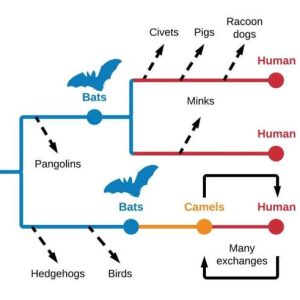News
CIPHER News

UNC Charlotte researchers analyzed the host origins of SARS-CoV-2 and other coronaviruses From the Janies Lab at UNC Charlotte To clarify the origins of coronavirus’ infections in humans, researchers from the Bioinformatics Research Center (BRC) at the University of North Carolina at Charlotte (UNC Charlotte) performed the largest and most comprehensive evolutionary analyses to date. […]
The female mosquito is the one that bites – and she’s looking to get some of your blood so she can digest it and convert it into the energy she needs to make her eggs. UNC Charlotte Professor Dr. Daniel Janies says he can explain why mosquitoes are especially bad in the Charlotte area. “We’ve […]
The tube anemone Isarachnanthus nocturnus is only 15 cm long but has the largest mitochondrial genome of any animal sequenced to date, with 80,923 base pairs. The human mitochondrial genome (mitogenome), for example, comprises 16,569 base pairs. Tube anemones (Ceriantharia) are the focus of an article recently published in Scientific Reports describing the findings of […]
An itchy summer is ahead for the city of Charlotte, according to Orkin. The bug company recently released their 2019 rankings of top mosquito cities, with the Queen City ranking number nine. With an increase of international travel, UNC Charlotte Professor Daniel Janies says the insects can bring risks of other diseases from far and […]

Corals depend on their symbiotic relationships with the algae that they host. But how do they keep algal population growth in check? The answer to this fundamental question could help reefs survive in a changing climate. New work published in Nature Communications by a team including UNC Charlotte researcher and lead author Tingting Xiang and […]

Special Cross Sciences Speaker in Microbial Genomics Dr. Jason Papin, Ph.D. University of Virginia Talk Title: Systems biology of microbial pathogens Date: Tuesday January 14, 2020 Time: 12:00 to 1:00 pm Location: Atkins Library, Room 271 Bio: Jason Papin is a Professor in the Department of Biomedical Engineering at the University of Virginia. After his […]
On Friday, January 31, UNC Charlotte’s College of Computing and Informatics (CCI) hosted a multidisciplinary forum to discuss and answer questions about Coronaviruses. In response to concerns, and even misinformation, about the situation playing out in Wuhan, China (and beyond), CCI used its weekly Graduate Student Seminar as the platform for this unique discussion of […]

Biology Seminar: Phages and their impacts on animal host biology Friday, February 7⋅12:30 – 1:30pm CHHS 161 Description: Seminar by Dr. Brittany A. Leigh, Vanderbilt University
We have shown connections between SARS-CoV and bat-hosted CoV in previous peer-reviewed research. The long term questions surround the potential of other animal-hosted viruses that connect bat-hosted and human-hosted viruses? Now that 2019-nCoV emergent from Wuhan seems to be transmitted human-to-human, the short term question is how to contain Wuhan-CoV? Articles: Ohio State University – […]
Local pharmacies said a lot of people concerned about COVID-19, the novel coronavirus, have been asking about surgical masks. On Thursday, Channel 9 stopped by two pharmacies and both were completely out of masks. The owner of Harrisburg Hometown Pharmacy, Sherrie Everhart, said they’ve been out of surgical masks for more than a week now. […]
The National Academy of Medicine predicts future pandemics could kill millions and cost trillions. Some worry it’s just a matter of time. Perhaps history’s most infamous pandemic was the Bubonic Plague – it ravaged 14th century Europe and killed an estimated 25 million people, about one third of Europe’s population. Of course, modern medicine has […]
Dr. Daniel Janies appears on air in light of a positive test for Coronavirus in Wake County raises concerns for the spread of the virus to other areas View the WSOCTV report here. https://www.wsoctv.com/video/?id=4852102
A local update on what public health officials are doing to keep abreast of the coronavirus. So far, we haven’t been affected here in Mecklenburg County, but the governor declared a state of emergency on Tuesday. What should you do? What is being done to keep the area healthy? As reports of coronavirus increase in […]
Down The Wormhole Podcast What is COVID-19? What is SARS-CoV-2? What is being done to stop this pandemic and what can we do to stay safe? We are joined by Dr Daniel Janies who is on the front lines of this crisis and graciously offered us an hour of his time to answer our burning […]
Watch the video on WBTV: https://www.wbtv.com/video/2020/03/28/bioinformatics-professor-speaks-flattening-covid-spread/ https://www.wbtv.com/video/2020/03/28/bioinformatics-professor-speaks-flattening…
In the epicenter of the United States’ coronavirus outbreak, even the lions and tigers started coughing. On Sunday, the Bronx Zoo announced that one of its majestic Malayan tigers tested positive for COVID-19, the respiratory disease caused by the new coronavirus. Meanwhile, three other tigers and three lions (who were not tested) were also sick […]
In case of a disease outbreak, efficient use of geospatial data and mapping technologies can help in both containing and responding to crisis, and the past decade stands testimony to that. Be it an interactive story map from Esri presenting a narrative of what is COVID-19, how the disease has spread and similar cases in […]
